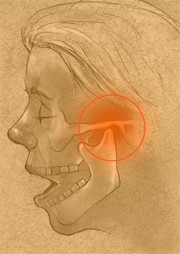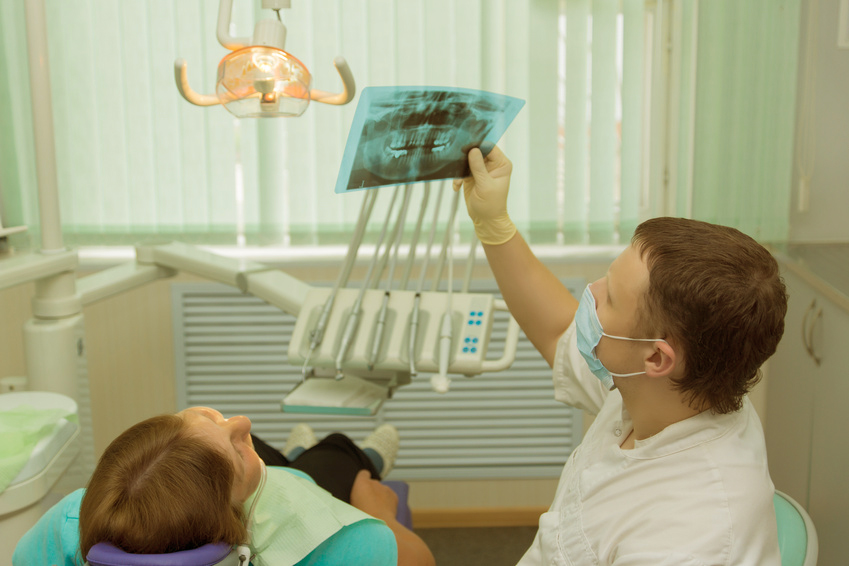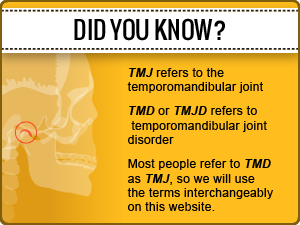What Is TMJ?
Learn more about it belowEveryone experiences occasional headaches, shoulder pain, or sore neck. Most of the time we can dismiss the cause as nothing more than stress or our busy lives, but, when pain becomes a daily occurrence or is accompanied by other symptoms, there could be something more going on.
If you are suffering from undiagnosed, chronic pain, TMJ may be the reason. But what is TMJ, and why does it cause pain?
TMJ is a complex disorder. Effective treatment depends on an accurate diagnosis.
If you would like to find out if TMJ is at the root of your chronic pain, take our TMJ questionnaire or, better yet, come in for a consultation.

Do I have TMJ Disorder?
Symptoms include migraines, neck pain, jaw pain, lower back pain, snoring, sleep apnea. Use our Free TMJ Disorder Assessment ToolsHow does your TMJ work?
 TMJ is an abbreviated term for the temporomandibular joint also known as your jaw joint. Other abbreviations; TMD for Temporomandibular Disorder and TMJD for Temporomandibular Joint Disorder, are also accepted and used interchangeably to refer to the pain, disorder or dysfunction of this joint and other affected areas surrounding it.
TMJ is an abbreviated term for the temporomandibular joint also known as your jaw joint. Other abbreviations; TMD for Temporomandibular Disorder and TMJD for Temporomandibular Joint Disorder, are also accepted and used interchangeably to refer to the pain, disorder or dysfunction of this joint and other affected areas surrounding it.
Like all of the wonderfully complex parts of our bodies, the temporomandibular joint is designed for smooth, continuous and pain-free operation. These two essential joints work in unison to allow you to:
- bite
- speak
- chew
- sing
- yawn
- laugh
- talk
In fact, for your jaw to do everything you need it to, it must be able to open close, move forward and back and from side to side.
The bones of your joints do not work alone. To move, each of your ball and socket jaw joints are cushioned by a disc and surrounded by the muscles, ligaments and nerves that make them work.
What causes jaw problems?
While TMJ causes are not always clear, they are often be related to specific events or life changes, including:
- uneven dentistry
- direct injury to the temporomandibular joint
- ongoing stress resulting in bruxism and clenching of the jaw
- shifting or missing teeth
- a misaligned jaw or underdeveloped jaw due to genetics or childhood breathing problems
- arthritis
- sleep disorders, especially sleep disordered breathing
Where does the pain come from?
 Since the TM joint consists of so many interdependent parts, if even one piece is out of commission, stressed or damaged in some way, the rest of the connecting parts are affected. This includes the part of our nervous system that is responsible for providing input to the brain for as much as 40 percent of the human head and face.
Since the TM joint consists of so many interdependent parts, if even one piece is out of commission, stressed or damaged in some way, the rest of the connecting parts are affected. This includes the part of our nervous system that is responsible for providing input to the brain for as much as 40 percent of the human head and face.
The nerve, specifically called the trigeminal nerve is of great interest to the physiologic dentist evaluating and treating TMJ disorders. As the name implies, there are three branches to this nerve, and they are connected with many of the functions of the TM joint, including:
- Routine chewing functions of the upper and lower jaw
- Swallowing
- Breathing
- Talking
- Kissing
- Eyes
- Ears
- Sinuses
- Teeth
Even though TMJ pain directly communicates through the trigeminal nerve structures, it may also result in referred pain to certain locations in the head and neck. Almost 100% of all headaches and migraines, as well as sinus pain are mediated primarily by the trigeminal nerve. Symptoms of referred pain may include the following symptoms:
- Frequent morning headaches or migraines
- Grinding, clicking or popping noise in the TM joints
- Dizziness
- Neck, shoulder or back pain
- Tinnitus
Learn more about TMJ
TMJ is a complex disorder. Effective treatment depends on an accurate diagnosis.
If you would like to find out if TMJ is at the root of your chronic pain, take our TMJ questionnaire or, better yet, come in for a consultation


Would Medicare and Medicaid insurance cover all cost
Do not expect any coverage from medicaid. Medicare may provide limited coverage if you can find someone in medicare who understands what is needed.
do you accept blue cross blue sheild alabama insurance .P.P.O plan
thank you
We accept all medical insurance and file it but are not part of any plans. HMO patients need to have referral from PCP.
Thank you doctor! i do have blue cross blue sheild alabama and my plan is PPO.i tried to reach your office today but it was unavailabe so i will appreciate if on of your staff reachs me out as soon as possible. i am having TMj which is getting worse.
thank you
I believe you have been set up an appointment. Had an Alabam patient last week as well.
I don’t have insurance how much the treatment will cost?
Treatment cost can vary depending on what specifically is being treated and how. Each and every patient is unique. Treatment is usually submitted to medical not dental insurance.
Also, do you have the 3D CT scan?
Thank you,
Jennifer
I have my 3D scans to a Radiology office close to my office or an Oral Surgery office.